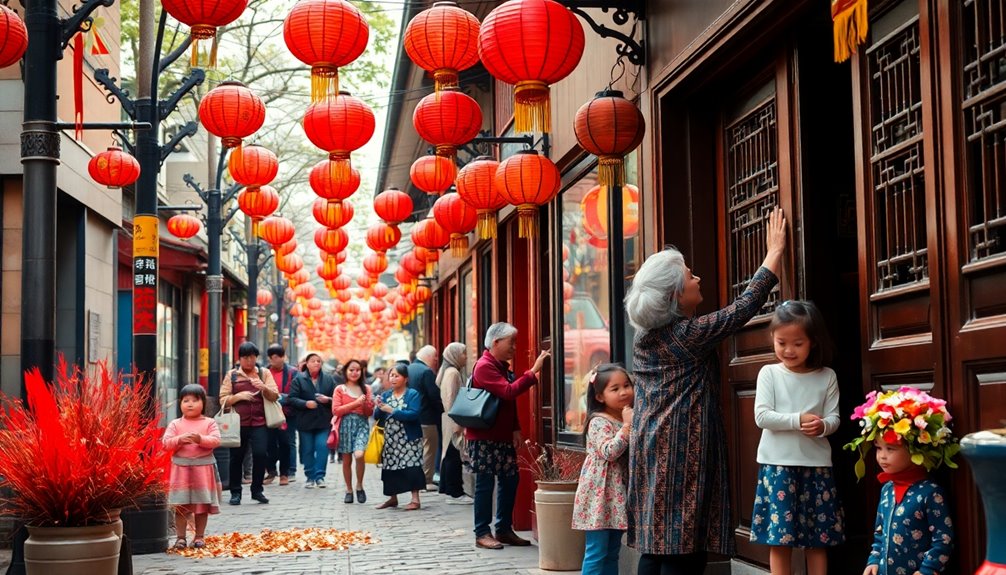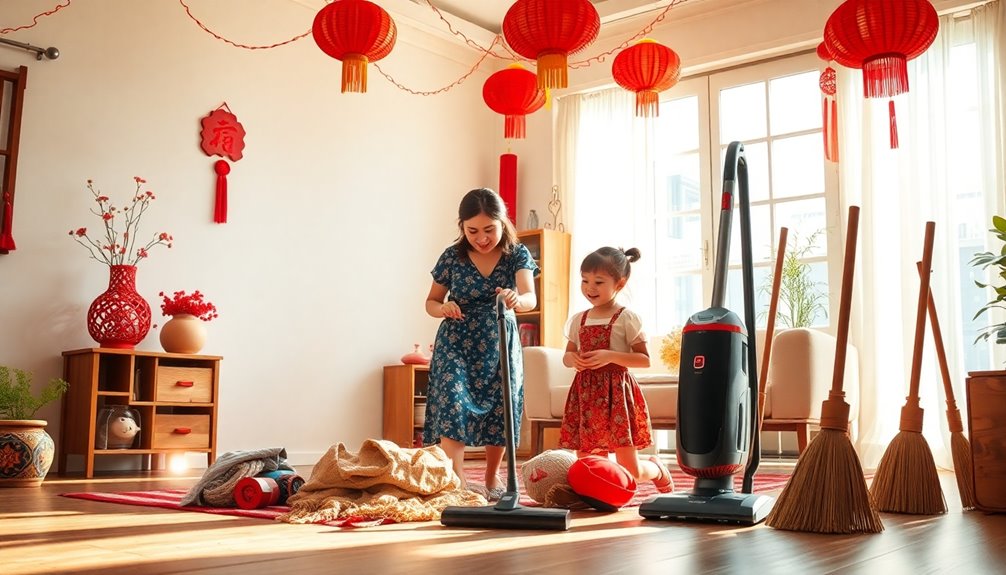You clean before Chinese New Year to sweep away bad luck and make room for good fortune. This tradition symbolizes a fresh start, inviting prosperity for the year ahead. The act of cleaning, deeply rooted in history, shows respect for your ancestors and reinforces family bonds. You typically start a week before Lunar New Year and avoid cleaning on New Year's Day to keep the good luck you've generated. It's not just about tidying up; it fosters a sense of renewal and mental well-being. If you're curious about the cultural significance behind this practice, there's much more to discover.
Key Takeaways
- Deep cleaning symbolizes the removal of bad luck and misfortune, paving the way for a prosperous new year.
- Cleaning is linked to historical practices that promote health and symbolize respect for ancestors during celebrations.
- The tradition emphasizes family unity, encouraging collaborative efforts to prepare a welcoming environment for festivities.
- All cleaning must be completed before New Year's Day to avoid discarding good fortune and to start fresh.
- Psychological benefits include reduced stress and improved mood, fostering positive energy and family bonding through shared rituals.
Importance of Cleaning Tradition

Cleaning before Chinese New Year isn't just a chore; it's an essential tradition steeped in meaning. You engage in this deep cleaning to remove bad luck and misfortune from the past year, allowing for a fresh start.
The act of cleaning symbolizes a renewal, making your home a welcoming space for the reunion dinner and guests. It's worth noting that the Mandarin word for dust, "chén," sounds like the word for old, reinforcing the belief that cleaning sweeps away the old and paves the way for good fortune in the new year.
Just remember, avoid any cleaning on New Year's Day itself; you wouldn't want to accidentally discard the good luck you've worked hard to invite into your life.
Historical Origins of the Practice

Cleaning before Chinese New Year has deep roots in ancient rituals, with practices documented as far back as 241 B.C.
The linguistic link between the word for dust and the concept of old age underscores the cultural belief in clearing away the past to invite good fortune.
Over time, these customs have evolved, but the core idea of starting fresh remains essential to the celebration.
Ancient Ritual Significance
As you prepare for the Lunar New Year, understanding the ancient rituals behind the practice of cleaning can deepen your appreciation for its significance.
Here are a few key points to take into account:
- The tradition dates back to 241 B.C., symbolizing the removal of disease and bad luck.
- Cleaning serves as a metaphorical purification, aligning with themes of renewal.
- Originally scheduled for the 24th day of December, it has evolved into an extensive end-of-year ritual.
- A tidy space is believed to welcome prosperity and good luck in the new year.
This ancient ritual reflects a cultural belief that by cleaning for Lunar New Year, you're not just tidying up; you're actively inviting fortune and fresh beginnings into your life.
Linguistic Connections to Luck
While many may see cleaning as a mere chore before the Lunar New Year, its linguistic roots reveal a deeper connection to luck and renewal.
In Mandarin, the word for dust, "chén," sounds like the word for old, linking cleaning to the removal of outdated or bad luck. This tradition dates back to rituals in the Master Lü's Spring and Autumn Annals around 241 B.C.
Deep cleaning traditionally occurs on the 24th day of December in the lunar calendar, symbolizing a fresh start. By embracing this act, you're not just tidying up; you're eliminating misfortune from the past year.
Consequently, cleaning becomes a powerful gesture of welcoming good fortune and prosperity in the new year. Engaging in this practice can also enhance mental well-being, similar to the benefits of positive thinking discussed in transformative literature.
Evolution of Cleaning Customs
Embracing the practice of cleaning before the Lunar New Year reveals its rich historical roots, which stretch back to ancient rituals.
This tradition of cleaning has evolved greatly, reflecting its cultural significance. Here are some key aspects of its evolution:
- Historical Origins: Recorded as early as 241 B.C., cleaning symbolized the removal of bad luck and disease.
- Timing Changes: Initially scheduled for the 24th of December, it's now a thorough end-of-year ritual.
- Modern Adaptations: Many families hire cleaners today, showcasing a shift in practicality.
- Symbolic Gesture: Cleaning serves as a renewal act, connecting generations through shared customs.
These cleaning customs not only prepare your home but also honor a rich cultural heritage that has withstood the test of time.
Timing and Preparation Guidelines

To guarantee your home is ready for the Lunar New Year, start cleaning about a week before the celebration, wrapping up your efforts by New Year's Eve.
Ideally, aim to finish your cleaning between the 23rd and 29th of the 12th lunar month. This timeline allows you to prepare for family gatherings while ensuring your home is a welcoming space.
It's essential to complete all cleaning by New Year's Day to avoid sweeping away good fortune that comes with the new year. Engaging in this deep cleaning symbolizes ridding your home of misfortune and disease, setting a fresh stage for the festivities.
Involve your family in these rituals to emphasize unity and collaboration during this important preparation.
Methods and Tools for Cleaning

Cleaning your home for Chinese New Year involves a blend of traditional methods and modern tools that make the process efficient and meaningful. Here are some effective strategies to take into account:
- Deep Clean: Prioritize a thorough cleaning of every room to guarantee a fresh start.
- Declutter: Remove unnecessary items to create a sense of space and renewal.
- Traditional Tools: Use brooms and dustpans, or even bamboo leaves, to sweep away bad luck.
- Symbolic Products: Incorporate cleaning products that hold cultural significance, enhancing the ritual.
Collaborating with family not only makes the cleaning more enjoyable but strengthens bonds.
Some even include rituals like burning incense to amplify the sense of purification, making the entire process deeply meaningful.
Cultural Variations in Customs

Cleaning customs for the Lunar New Year vary widely across cultures, each reflecting distinct beliefs and practices.
As you explore these regional differences, you'll notice unique rituals that add personal significance to the preparation process.
From honoring ancestors in Vietnam to warding off bad luck in Korea, these variations highlight how local culture shapes these important traditions.
Regional Cleaning Practices
As you explore the rich tapestry of Lunar New Year customs, you'll find that regional cleaning practices vary significantly across cultures, each reflecting unique beliefs and traditions.
Here are a few significant practices:
- Chinese: Focus on cleaning kitchens and dining areas, emphasizing food preparation's importance.
- Vietnamese: Clean ancestral altars to honor family lineage and ancestors during the celebration.
- Korean: Engage in "sijip," a thorough house cleaning that symbolizes starting the new year fresh.
- Community Rituals: In some regions, burning incense during cleaning enhances the symbolic significance of the activity.
These diverse cleaning traditions highlight the importance of heritage and family values in celebrating the Lunar New Year, showcasing how each culture connects with its unique customs.
Unique Rituals and Beliefs
While preparing for the Lunar New Year, many cultures embrace unique rituals and beliefs that enrich their celebrations.
In Chinese culture, cleaning symbolizes the act of sweeping away bad luck and misfortune from the past year, welcoming a fresh start.
Vietnamese traditions emphasize cleaning ancestral altars, honoring past generations and reinforcing family ties.
Korean customs include "sijip," a thorough cleaning ritual that often integrates specific prayers or blessings, adding a spiritual dimension to the task.
Some regions prioritize cleaning kitchens and dining areas, while others focus on sacred spaces.
Unique rituals, like burning incense during cleaning, enhance the activity's significance and promote positive energy for the New Year, making these practices deeply meaningful across cultures.
Influences of Local Culture
Embracing the spirit of renewal, cultures around the world exhibit distinct cleaning customs that reflect their unique heritage and beliefs about luck and fortune.
Here are some examples of these traditions:
- In Chinese culture, kitchens and dining areas get special attention, symbolizing food and family unity.
- Vietnamese customs involve cleaning ancestral altars, honoring deceased family members as a sign of respect for ancestors.
- Koreans perform a thorough house cleaning known as "sijip," often accompanied by prayers or blessings for prosperity.
- Regional practices may vary, from using traditional tools like bamboo leaves to adopting modern cleaning methods.
These cleaning traditions highlight the significance of honoring ancestors and the cultural values tied to preparing for a prosperous new year.
Psychological Benefits of Cleaning

Cleaning before Chinese New Year isn't just about tidying up; it can greatly improve your mental well-being. The act of cleaning brings a sense of renewal and mental clarity, reducing stress and enhancing your overall mood. A tidy environment fosters positive energy, allowing you to focus and feel more at peace.
Engaging in cleaning rituals also strengthens family bonds, turning the task into a shared experience filled with mindfulness. As you sweep away the clutter, you're symbolically pushing aside bad luck, reinforcing hope and optimism for the new year.
Plus, participating in these traditional practices helps you connect with your cultural identity, nurturing a sense of belonging within your family and community.
Modern Adaptations and Challenges

As families embrace modern lifestyles, the ways they prepare for Chinese New Year have evolved. Here are some key changes you might notice:
- Many families hire professional cleaners instead of deep cleaning themselves.
- Time constraints often condense cleaning rituals, impacting thoroughness.
- Children learn about the holiday through modern activities rather than traditional cleaning customs.
- The use of modern cleaning tools has simplified the process, making it more efficient.
While you still aim to honor your heritage, adapting these practices to fit busy lifestyles can pose challenges.
You might find that younger generations prioritize convenience over cultural rituals, leading to a shift in how families celebrate this important time.
Balancing tradition with modernity is essential for maintaining the spirit of the holiday.
Frequently Asked Questions
Why Do People Clean the House Before the Chinese New Year?
Cleaning your house before the Chinese New Year helps you sweep away any bad luck and misfortune from the past year.
It's a way to prepare your home for a fresh start and invite prosperity. You usually start deep cleaning about a week before the New Year, finishing by New Year's Eve.
This guarantees your space is tidy for family gatherings, fostering unity and honoring traditions as you celebrate together.
Why Do People Clean Their House Before the Start of the New Year?
You clean your house before the start of the new year to create a fresh and welcoming environment.
It's a way to clear out the old and make space for new opportunities and positivity.
By tidying up, you're also symbolically driving away bad luck and negativity from the past year.
This ritual helps you feel organized and ready to embrace the new beginnings and challenges that the upcoming year brings.
Why Do Japanese People Like to Clean Everything Before the New Year?
Imagine stepping into a fresh, serene space, where every corner sparkles with possibility.
Japanese people clean before the New Year to create this atmosphere. You're not just tidying up; you're sweeping away bad luck and inviting good fortune.
This tradition, called "osoji," helps clear your mind and heart, allowing you to embrace the upcoming year with positivity.
It's a beautiful way to honor your home and set a vibrant tone for new beginnings.
What Must You Clean Before Chinese New Year?
Before Chinese New Year, you should focus on deep cleaning your home to create a fresh start.
Pay special attention to your kitchen and dining areas, as they symbolize prosperity.
Don't forget to tidy up your garden and entryways, making them welcoming for guests.
Aim to finish all cleaning by New Year's Eve, since cleaning on New Year's Day is thought to sweep away good fortune.
Incorporating symbolic practices can enhance your cleaning ritual.
Conclusion
Cleaning before Chinese New Year isn't just a chore; it's a cherished tradition that symbolizes renewal and fresh beginnings. It allows you to clear out the old to welcome the new, to create a harmonious environment for prosperity and joy. Embracing this practice connects you to history, enriches your spirit, and fosters a sense of community. So, as you scrub and sweep, remember you're not only tidying your space but also inviting in a brighter future filled with hope and good fortune.









